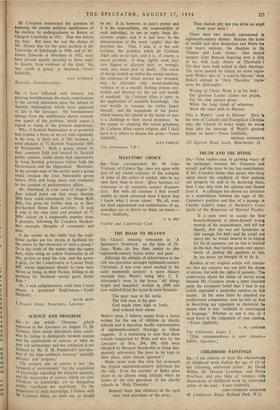TRUTH AND THE DYING
SIR,—Your readers may be growing weary of the exchanges between Mr. Cranston and myself; and this must be my last contribution, If Mr. Cranston thinks that nurses who keep silent about the condition of their patients can properly be said to be deceiving them, then I can only note his opinion and dissent from it. A colleague has drawn my attention to a resemblance between the logic of Mr, Cranston's position and that of a passage in Charles Lamb's essay A Bachelor's Com- plaint of the Behaviour of Married People:
If a man were to accost the first - homely-featured or plain-dressed young woman of his acquaintance, and tell her bluntly, that she was not handsome or rich enough for him, and he could not marry her, he would deserve to be kicked for his ill manners; yet no less is implied in the fact, that having access and oppor• tunity of putting the question to her, he has never yet thought fit to do it.
Readers of my original article will remems ber that my concern was not with the duties of nurses, but with the rights of patients, The 'controversy about the duties of nurses arose because Mr. Cranston wrote a letter founded upon the erroneous belief that I had in my article expressed a particular opinion on this matter. In the same letter he attacked my professional competence; now he tells us that in describing my argument as rhetorical he means that it was ' artificial or extravagant in language.' Whether or not it was so I must leave to the judgement of your readers, —Yours faithfully, J. M. CAMERON The University, Leeds, 2
[This correspondence is now closed.— Editor, Spectator.]


































 Previous page
Previous page